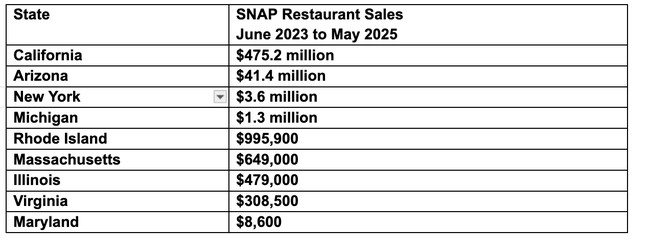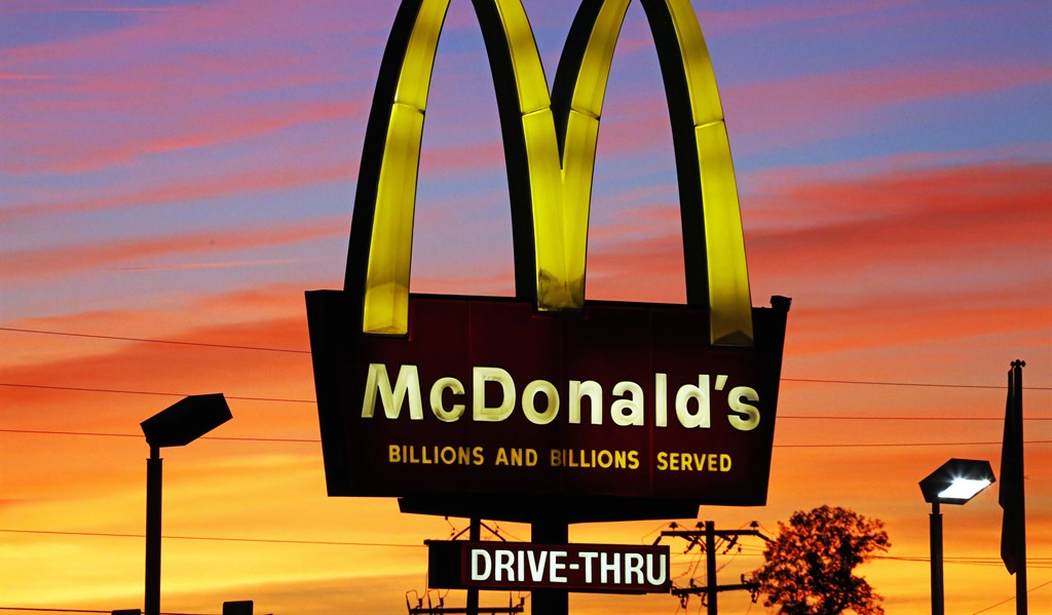While the U.S. Department of Agriculture considers reform to the Supplemental Nutrition Assistance Program that helps feed 42 million people, one lawmaker is pushing legislation aimed at curbing the program’s use at fast-food restaurants nationwide.
Sen. Joni Ernst, R-IA, cited new data from the USDA that exposes how blue states have abused the SNAP program to spend $250 million per year on fast food through the 1977 exception to the “hot food” restriction through the Restaurant Meals Program.
While SNAP's original intent was to provide food-insecure families basic staples, like meat, fruits, and vegetables, loopholes created by Congress in 1977 for “hot food” have been exploited by nine states to provide a nearly $250 million/year handout to fast food restaurants like McDonald's, Burger King, and Jack In the Box. California accounts for more than 90% of this spending. In recent years, the program has ballooned at an alarming rate, particularly in California, where state officials and the Biden-controlled USDA authorized more than 5,800 restaurants to accept SNAP benefits.
Over time, eligibility was expanded to include disabled and elderly individuals, along with their spouses. The change aimed to serve homeless people who don’t have kitchens or refrigerators, but now it allows recipients to spend the funds at fast food restaurants.
Ernst pointed to nine states —Arizona, California, Illinois, Maryland, Massachusetts, Michigan, New York, Rhode Island, and Virginia—that have opted into RMP. Participating restaurants must be located in an RMP-approved state, sign an agreement with that state, and be authorized by the U.S. Department of Agriculture to accept SNAP benefits. Historically, participation was limited to a small number of restaurants within select counties.
Recommended
New data provided by Ernst's office from the USDA shows that from June 2023 to May 2025, over $475 million in taxpayer dollars were spent and redeemed at fast-food restaurants in California alone.

In total, $524 million went out through the restaurant meal program. Many participating chains are large national fast-food chains, including McDonald’s, Burger King, KFC, Taco Bell, Denny’s, Popeyes Chicken, Carl’s Jr., Pizza Hut, Domino’s Pizza, Jack in the Box, Panda Express, and Wendy’s.
“The ‘N’ in SNAP stands for nutrition, not nuggets with a side of fries,” Ernst told Townhall in an email. “I wish I were McRibbing you, but $250 million per year at the drive-through is no joke and a serious waste of tax dollars. I hate to be the one to say McSCUSE ME, but something needs to be done because taxpayers are not lovin’ it.”
The answer should be NO, and I have a bill to stop it!
— Joni Ernst (@SenJoniErnst) November 20, 2025
My McSCUSE ME Act will restrict SNAP dollars from being spent at fast food chains and refocus the program on its original mission: feeding hungry Americans.
The “N” in SNAP stands for nutrition, not nuggets! https://t.co/vzDDtPjE4o
She introduced the McSCUSE ME Act, which proposes several reforms:
- Program Eligibility: continues to allow homeless, elderly, and disabled participation but removes automatic spousal eligibility.
- Vendor Participation: narrows eligibility to vendors with (a) healthy prepared food options and (b) food safety/retail oversight (e.g. Harris Teeter or Whole Foods with a hot bar). No fast-food chains.
- Public Reporting: requires a public annual report to show (a) the number of participating vendors, (b) the number of participating beneficiaries, and (c) total program costs.
The bill aims to focus on providing nutritious food to vulnerable Americans. The SNAP program has drifted from its original mission of providing healthy food, Ernst said.
Last week, USDA Secretary Brooke Rollins said that SNAP fraud was “out of control.”
SNAP fraud is out of control, and the numbers we HAVE prove it.
— Secretary Brooke Rollins (@SecRollins) November 13, 2025
Data from just 29 states uncovered nearly 200,000 people with dead people’s social security numbers… Meanwhile, 21 states are suing to keep their data hidden.
Why block transparency unless the truth is worse than… pic.twitter.com/XAjHKncCfp
Mcscuse Me Act by scott.mcclallen
Editor’s Note: Do you enjoy Townhall’s conservative reporting that takes on the radical left and woke media? Support our work so that we can continue to bring you the truth.
Join Townhall VIP and use the promo code FIGHT to get 60% off your VIP membership!

























Join the conversation as a VIP Member